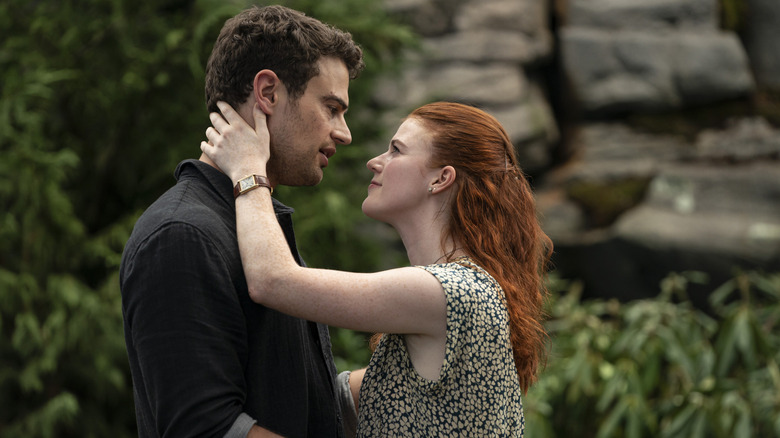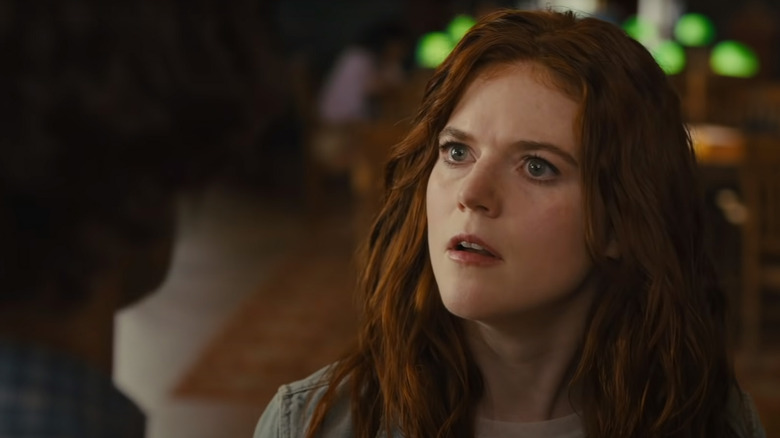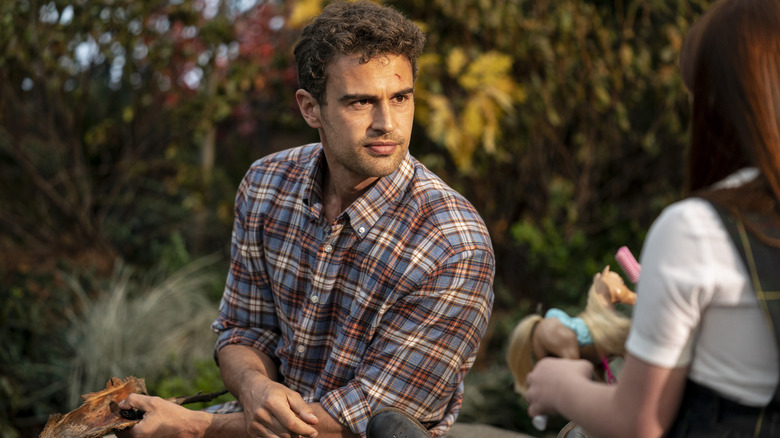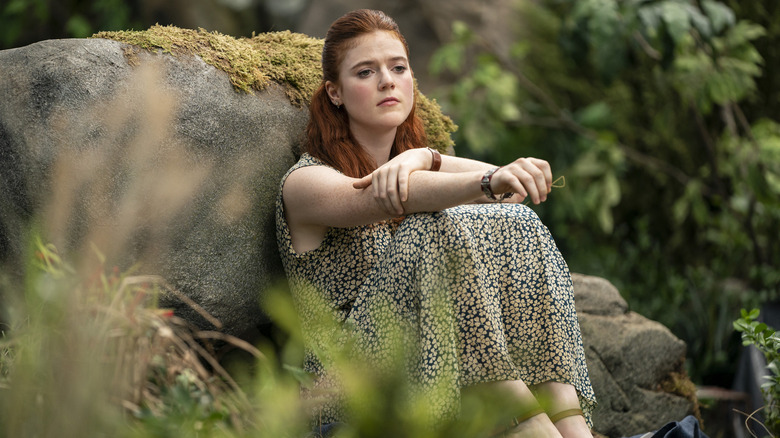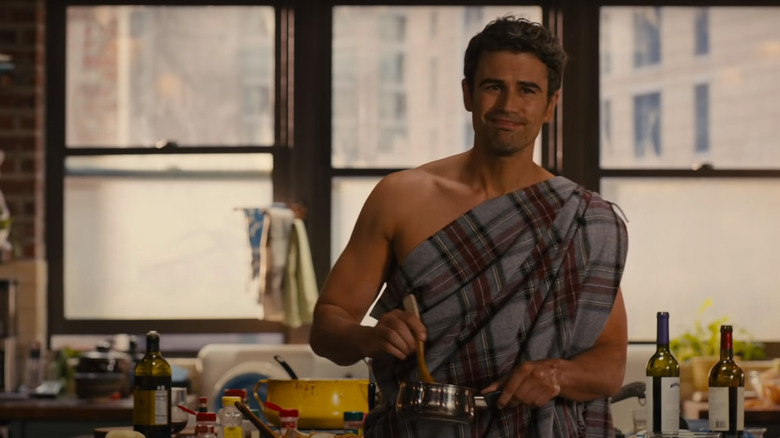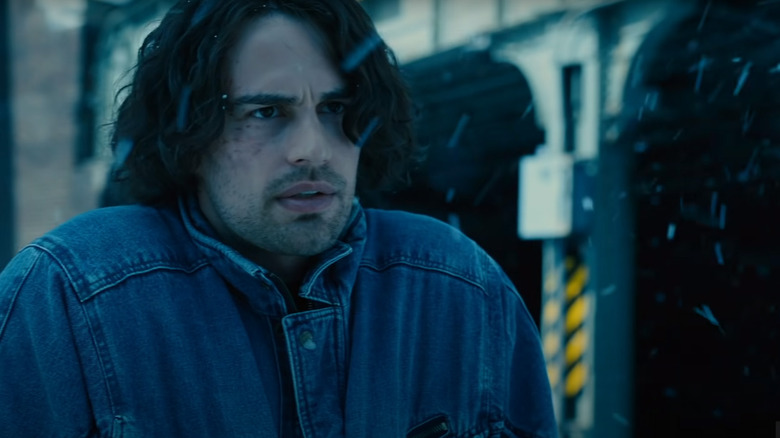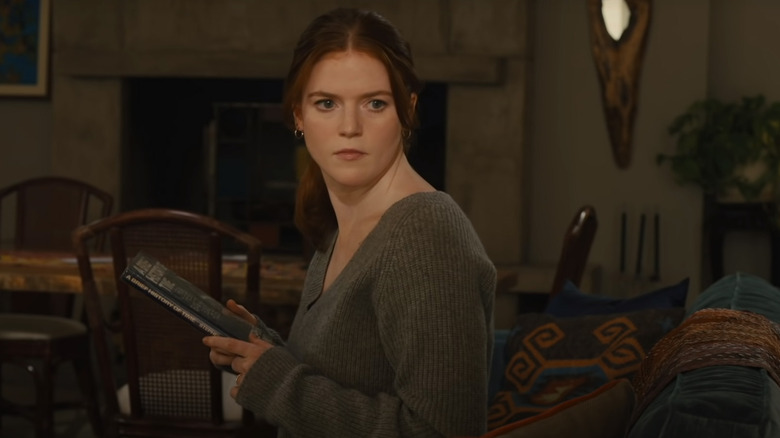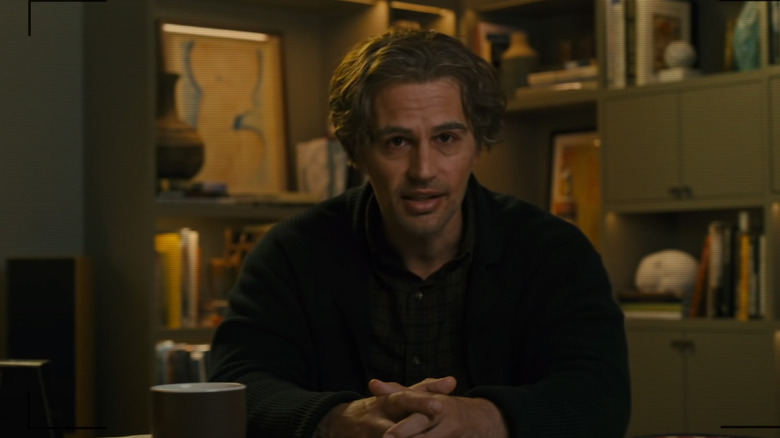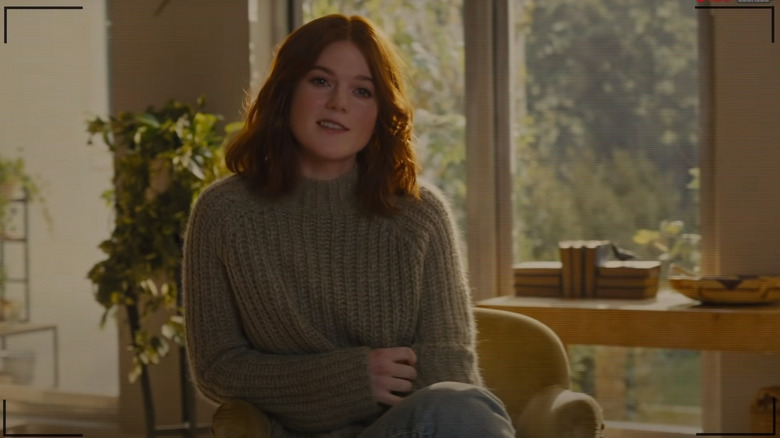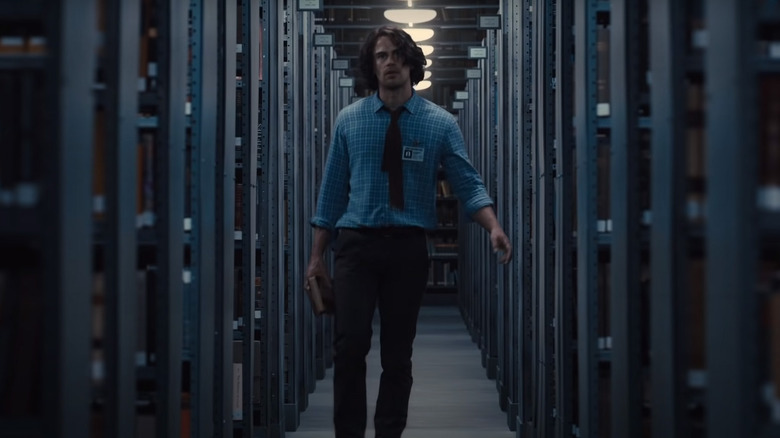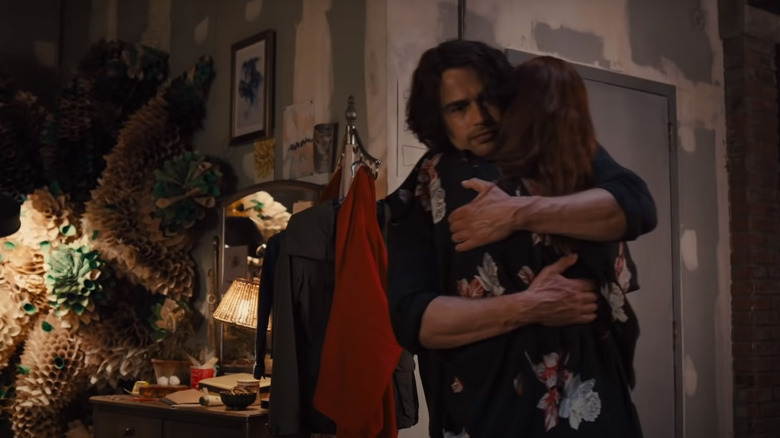The Time Traveler's Wife Writer Steven Moffat Gets Sentimental About Love And Time Travel [Interview]
The new HBO series "The Time Traveler's Wife" sees some of today's best science fiction storytellers tackling a beloved tale about a romance that happens out of order. Based on the best-selling 2003 novel of the same name by Audrey Niffenegger, the show is written by "Doctor Who" and "Sherlock" showrunner Steven Moffat, and all six episodes are directed by David Nutter ("Game of Thrones"). The titular time traveler's wife, Clare Abshire, is played by "Game of Thrones" alum Rose Leslie, and her temporal-trekking hubby Henry DeTamble is played by "Divergent" star Theo James. But Henry doesn't travel time like most other sci-fi heroes, instead slipping and sliding through time seemingly at random. He first meets Clare when he's already middle-aged and she's only eight, but when they meet as young adults years later, he hasn't actually met her yet so he doesn't remember. Confused yet? So is he, though since he time travels without his clothes and often ends up in the middle of train tracks or streets, he has much bigger problems.
I had the chance to sit down and chat with Moffat via Zoom, and he was keen to share the details on his love for romantic stories, time travel stories, dry British humor, and just how "The Time Traveler's Wife" differs from his work on "Doctor Who," despite both being about romances between a time-traveling man and his ridiculously patient partner.
'I was drawn in by the time travel, but entranced by the love story'
What drew you towards this story?
Well, I suppose to be absolutely honest, because I'm that kind of man, I saw the word[s] "time travel" on the cover and I love a time travel story, I haven't kept that secret. Also a friend of mine, Gary Gillette, told me, "Look, you're going to love this book," and recommended it to me. So I trusted his judgment and I did love it. So I think like a lot of people, like a lot of geeks and nerds like me, I was drawn in by the time travel, but entranced by the love story. And to be honest, I'm an incredibly sentimental man. So a combination of time travel and romance really does it for me. You'd be hard-pressed for me to walk past if that was on offer.
'I'm assuming I'll screw up somewhere, but hopefully not too badly'
I was going to say, this really isn't your first rodeo writing time travel at all, but it's quite a bit different from something like "Doctor Who."
Very much so.
How do you organize the time travel elements to keep yourself from getting confused? Because there's a lot of hopping about.
Oh, Christ, Danielle, it's a bloody thought, I'll tell you. And I'm assuming that I'm going to make a mistake at some point — someone like you will point it out, I'm assuming. I do my very best and on "Doctor Who" I could always say, "Ah, well, time changed." Time does not change on this one. So I'm f***ed if I get it wrong. I think I found the mistake in the book, I'm never going to say what it is, but I think I found one. And it's ... I'm sorry, Audrey. But you have to say, "Okay, if Henry's 36, then he's already been in episode six of this series, so he already knows how that ends. So he shouldn't be confused when that person says this." That's the fact, that's the problem, so wow. So I'm assuming I'll screw up somewhere, but hopefully not too badly. I really try, I do really try.
'Have you ever found a simple romance?'
There's an interesting thorough-line in your work of complicated, often absent men in relationships with strong fiery women, from Irene Adler and Sherlock to the companions of the good Doctor. What draws you to these kinds of complex romances?
Complex romances? Whereas you mean all those simple romances you know about? Have you ever found a simple romance? No. Fiery women, there's an alternative? I never found one. There's always the stand-by of the docile woman in fashion. And I always want to say, "Has anyone met one? What would they be like?" So I think ... absent men? I don't know if I ... well, Sherlock is a weird old creature, but so is Irene. I mean, they're absent from each other, aren't they? I mean, if they had the remotest sense to get a house and buy a Volvo or something, but they don't, so they're absent from each other. Do you mean by that, emotionally unavailable?
Emotionally unavailable, or in Henry's case, physically unavailable.
Well, but he doesn't want to be unavailable.
No.
He just has to be. He does everything in his power to get back. He's emotionally so available, it's ridiculous. I mean, in the book, he's just completely delighted when she says, "I'm your future wife." I made him slightly more resistant to the idea in the first episode, but even then he doesn't really fight it very hard. "I'm going to get married to Rose Leslie, it could be worse." I mean, come on. So he just goes for it. I don't know, I don't think of Henry as anything like ... I mean, the Doctor and Sherlock Holmes for reasons of format, have to not settle down, really. The show would be rather boring if they did that.
Whereas the difference with Henry and Clare is they want nothing more than to settle down. That's what they want. That's what most of us want. Very few people — I've never met anyone like Sherlock Holmes or Doctor Who or James Bond or any of those people who just say, "No, I fight my own way and I prefer to be alone." Literally, never met anyone like that. I meet people who want to be with someone and go out with friends, that's what I meet. So I think Henry and Clare have an exotic problem at the heart of their life, but otherwise they're pretty much like us.
'It's not Doc Brown showing off his DeLorean, is it?'
And Henry's method of time travel is pretty unusual. He just disappears as readily as you or I might sneeze.
Yeah.
How do you think that might affect him, not only as a man, but as a husband?
Well, ultimately, it kills him. It's hard to know. One of the things you have to keep in your head writing this, is time travel is ordinary to both of them. They both grew up with it. He grew up doing it and she grew up knowing that time travel was real, because she kept meeting him in the clear, so both of them are used to this. That's the weird thing, they talk about time travel the way you talk about, "Oh, you've got your hay fever again, haven't you?" That's what it is for them. And it's quite important to bring in other characters to go, "Wow, you're a time traveler." Because otherwise no one says, "Wow." It's not Doc Brown showing off his DeLorean, is it? It's, "Oh God, you've done it again." Sorry, what was the original question? I drifted there.
Oh, just how might that affect him as a person and as a husband?
Oddly, I think he just feels — I think he wishes it would go away. He's not defined by that problem. Henry takes no interest in science fiction. He likes old things, he likes books and sitting and watching telly. He's fairly repulsed by any film or piece of fiction about time travel: He doesn't like it at all. I think it's like someone with a serious illness — he doesn't really want to talk about it all the time. If you know someone who's ill and it's a long-term, chronic illness, they really don't want to talk about it every day. They'd rather be talking about something else. Because everything is boring when talked at length. So I think he does a very good job of maneuvering his life around it.
'He's always got a get out of jail free card, hasn't he?'
And I like that you mentioned it's like a chronic illness, because in a way, his time travel almost is like a chronic illness.
It is. It's a chronic illness, yeah.
It's just this thing that happens to him.
It's exotic, but it's not anything that he can do anything about.
And we discover that all of Henry time travels from his toe nail clippings to blood. How does that work? What if his blood shows up at a crime scene?
All those things we can do, yeah. I mean, he's always got a get out of jail free card, hasn't he? It will disappear as well, right? So I mean, he's always getting in trouble, but it just flits around the place. So yeah, you could have difficulties with that, but difficulties on a short term basis. It's not his biggest problem. Landing on a railway track in front of a train or in the lion cage at zoo, that's his problem. Yeah.
'It's not really about time travel, it's about love and it's about relationships'
There's already a "Time Traveler's Wife" movie adaptation with Rachel McAdams and Eric Bana. What changes and expansions were you able to make by doing a series instead of a movie?
I mean, I think it's a good movie. It has to spend quite a lot of its running time getting the rules right. And they do it very efficiently and very effectively, actually, in the movie, explaining it. But it places a greater emphasis on the time travel — and therefore, Henry — than is the case in the book, where if anything, the emphasis is on Clare and their life, because you've got the space just to say, "Well, here are the rules of the time travel. Have you got them yet? I'll remind you. Well, I'll remind you, there, you've got..."
It takes us probably three episodes, I would say, just to nail it down for the audience and say, "He can't change anything." You can't say these things once, you've got to say them several times. No, he's not there to save people, he's not going to alter anything that's ever happened. You really have to nail it down to allow the rest of the show to breathe. Because as I say, it's not really about time travel, it's about love and it's about relationships. But you really need to understand the mechanism, otherwise you're screwed. So I think that's the advantage. It's more of an emphasis than anything.
'All three of my TV shows started getting made at the same time'
And how was it working with David Nutter, one of the longest and hardest working people in American sci-fi? Did you get to work with him hands-on very much?
Well, I would've and we talk a lot, but there was a pandemic. And all three of my TV shows started getting made at the same time. And two of them were in England and one of them was in New York, and there were Covid protocols. I was on three different versions of a Covid protocol. I couldn't travel anywhere without 10 days quarantine. So for the most part, I was communicating with David by phone, by Zoom call and email, watching all the rushes and interacting with him that way. And strangely enough, it worked. I hadn't ever been like that on a TV show before. I've usually been more physically present. I wasn't there until the last week. But it did work.
That aspect of it is a bit joyless. It takes a lot of the heart and joy out of television production when you have to do it that way. But it took none of the joy out of getting to know David Nutter, who is a delightful, brilliant man, with an enormous heart and limitless enthusiasm and energy. So he was great and I hope that if we get a second run to be there and be part of it, because a lot of the joy is the people. And instead, if you're stuck in another country, just occasionally getting in touch, saying, "I didn't like that bit of the dailies. Could you do that again?" You just sound like a long distance grump, but there you go.
'This kind of comedy, you're going to end up with Brits'
Do you have plans for a second season or ideas where you would want to take it for a second season?
I know exactly what we should do and I hope we get to do it. Yes.
Was there a reason that two British people were cast as Americans? Or is it just because they're both so stunning and talented?
I mean, you don't cast anyone for any reason other than being stunning and talented. I have to say the casting director said, "Look, this kind of comedy, you're going to end up with Brits." And I said, "Come on, we've got to have some American people in this." And they said, "Okay." And I mean, I certainly wasn't trying to cast British people, I was trying to do the opposite. I didn't even know Theo was British. That's the truth. He's far too good-looking to be British. How did that happen? Because I'd seen him in a movie, a very good movie, "Archive," and he was American in that, so I didn't know. And who the hell knows? I know what Rose Leslie's accent really is like. She's very, very, very posh, she's a very posh English lady. Well, actually she's Scottish, but she's so posh, she's gone England. So they're both very, very good at it and they're not cast because they're British, no. That wasn't me bringing the home land with me at all, not at all. Quite the opposite.
'I like one foot in the real world and one foot in the mad world'
You've said you like time travel, but what draws you towards genre storytelling like sci-fi and horror in general?
Oh, I don't know. Does anyone ever actually know why they're drawn to that? I don't know. I mean, I've got limits on that. I was discussing this the other day: I don't like to go totally fantastical, I've got to say. I like one foot in the real world and one foot in the mad world, is what suits me. If it's all set in the land of Crantothor where the Gargarons are ... shut up. [laughs] But I like throwing an element of science fiction into the real world that illuminates the real world.
And I would argue that the successful science fiction has always been relatable to the real world. Like "Star Wars" is a Western, you can see it, especially the first film, it's basically a Western based in space. "Star Trek," that's a military vessel, right? That's a war ship sailing in the sea. We know what that is, it behaves exactly like one. And "Doctor Who" has always been a show set more under your bed and at the back of your old cupboard than in outer space. It's always been domestic in a strange way. I like that. I don't know what draws me to it — the fact I never grew up, probably. Immaturity.
'I think when you see yourself reflected in the eyes of someone who has the foolishness to love you, then you realize you could be better'
There were some concerns when the book and the movie came out that a man meeting his wife as an eight-year-old potentially puts them in a power imbalance. How did you set out to address that part of the story?
I think that's a very distorted view. And I mean, it doesn't ... I mean, first of all, if you think that you meeting an eight-year-old puts you in charge, you haven't met many eight-year-olds. But it's not like that at all, you know, he's an absolutely kind old uncle figure with little Clare. There is no suggestion of anything weird or controlling, he's never controlling with her. It is absolutely the other way round, as it's in most relationships. It's absolutely the other way round. Clare doesn't change from being the little girl to being the old woman, right? She doesn't change. She's exactly the same person. Henry is completely rebuilt by Clare. The guy she meets in the library is one guy and the guy she turns him into — it's what every woman thinks when they meet their ideal man, "Wouldn't he be great if he was entirely different?", and they set about making a new one. And I like that.
I think when you see yourself reflected in the eyes of someone who has the foolishness to love you, then you realize you could be better. You could be the person that they think you are. I think both men and women do that. "I could raise my game a bit. They think I'm great. Well, I better do my best impersonation of great, or I'm kind of f***ed here." So I think he's that. But the idea of grooming, of power imbalance, you can choose malevolently to pre-see the show to make it sound like that. But it's not what's on the screen, it's not what's on the page, it's not what's in the movie, and I'm sure it won't be in the musical. It's not like that. And every version of Clare is in charge of Henry. Come on. He does what he's told.
"The Time Traveler's Wife" premieres on HBO on May 15, 2022.
